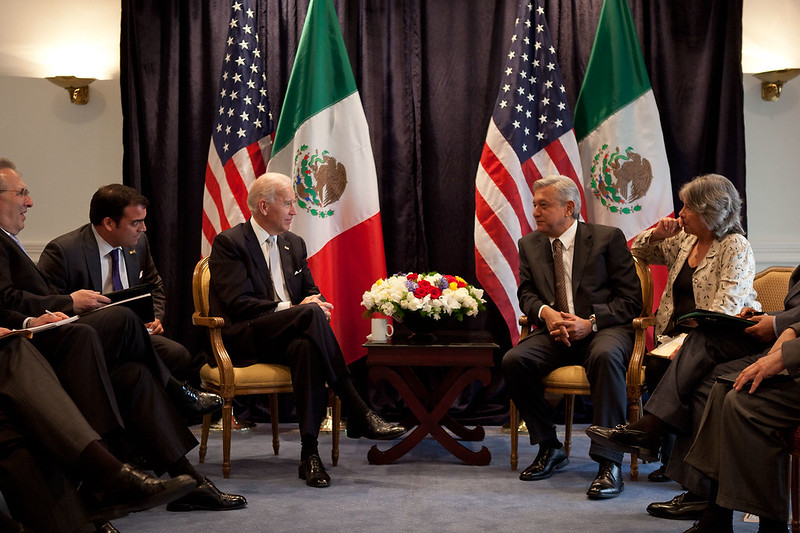Launching Missiles Is Easy, Drug Control Is Hard
The U.S. needs to mend its relationship and collaborate with the Mexican government in order to improve counterdrug cooperation and save American lives.

Published by The Lawfare Institute
in Cooperation With

In April 2022, the Biden Administration released its long-awaited blueprint to tackle the worsening U.S. drug crisis. The 2022 National Drug Control Strategy is a hefty 150 pages (by comparison, the Trump administration’s 2020 National Drug Control Strategy was only 41 pages) and outlines an ambitious plan to reduce illicit drug use and enhance public health and safety. This followed the January release of a new “Bicentennial Framework for Security, Public Health, and Safe Communities” between Mexico and the U.S., which marked 200 years of diplomatic relations between the two countries and a “new era in security cooperation based on partnership and guided by shared responsibility.” Each strategy reflects a more nuanced approach to foreign affairs that acknowledges the limits of American power.
These two policy statements come at a time when the U.S. and Mexico are reeling from twin public health crises. In 2021, nearly 108,000 Americans died from drug overdoses, the highest number on record and an incredible 500 percent increase since the beginning of the century. Meanwhile, more than 33,000 Mexicans were killed in 2021, many of them connected to the drug trade.
Not long after the Biden administration issued its National Drug Control Strategy, former Secretary of Defense Mark Esper published a memoir about his time in the Trump administration, which provides a fascinating—and terrifying—glimpse into the former president’s final days and reveals several unusual proposals floated by Trump and his staff. Among these was the notion that the U.S. should launch missiles into Mexico to “destroy the drug labs.” On at least two occasions, Esper claims, Trump asked him if the U.S. could “shoot missiles into Mexico” to “take out the labs, quietly,” suggesting it could be kept a secret. Esper noted he would not have believed it “had he not been staring Mr. Trump in the face.”
Esper may have mixed motives in sharing these details; after all, he is likely trying to rehabilitate his image and distance himself from his former boss. There is, however, little reason to doubt the sincerity or truthfulness of his account. From the beginning, the Trump administration sought to position itself as “tough on crime” and pledged to do more to address the opioid crisis. Trump’s proposal to bomb Mexican drug labs, while imprudent, is consistent with that goal, and while Esper rightly opposed the idea, it’s likely that others in the administration supported it as part of a more hardline policy toward Mexico. Indeed, Republican Rep. Mike Waltz of Florida recently defended the proposal and lauded Trump for his “ability to see things differently” and challenge the D.C.-based foreign policy establishment.
With all due respect to Waltz, Trump’s suggestion to unilaterally launch missiles into a neighboring, allied country, reflects a deeper misunderstanding of national security and foreign affairs than any kind of “disruptive,” outside-the-box thinking. For example, according to Esper, Trump sought to strike Mexico with Patriot missiles—an air defense system ill suited to engage clandestine drug labs. At best, Trump’s proposal was a well-intentioned—but misguided—attempt to stem the flow of drugs devastating American communities. At worst, it reflected a wanton disregard for international norms and a devil-may-care approach toward one of America’s closest allies and largest trading partners.
The Trump administration recognized the significance of the drug crisis—to his credit, Trump was the first to declare opioid abuse a national public health emergency, and he established a President’s Commission on Combating Drug Addiction and the Opioid Crisis. But time and time again, when confronted with a complex problem like drug trafficking, Trump reacted the only way he knew how—by talking tough and threatening blunt action. And in Trump’s final days, with the presidential election quickly approaching and the votes he needed coming from those areas most affected by the rise in drug overdose deaths, Trump made drastic proposals that the U.S. should bomb drug labs in Mexico, shoot migrants crossing the border, and shut down the southwestern border to all immigration.
Fortunately, Trump and his associates didn’t act on all of these impulses. This same short-sightedness, however, did lead to other serious missteps, such as the arrest of Salvador Cienfuegos, the embattled former Mexican secretary of defense, which touched off a historic low point in U.S.-Mexico security cooperation that continues today. In the wake of this incident, Mexican President Andrés Manuel López Obrador—known colloquially as AMLO—issued a new national security law that neutered U.S. law enforcement, shuttered elite counterdrug units vetted and trained by the U.S. Drug Enforcement Administration (DEA), and grounded DEA’s aircraft.
The establishment of the new national security law effectively ceased cooperation between U.S. and Mexican law enforcement. Among its provisions, the legislation stripped foreign agents of diplomatic immunity and severely restricted their ability to operate in Mexico, for example, by requiring all Mexican law enforcement officials to receive prior authorization to meet with foreign law enforcement and to provide a written report about such meetings to the foreign and public security ministries. A failure to comply with the law could result in administrative and criminal charges and expulsion (or imprisonment) of foreign agents.
The quick passage of the Mexican national security law was a knee-jerk reaction to the Cienfuegos arrest and a sharp rebuke to Washington’s handling of the case, but it also reflects AMLO’s broader policy of nonconfrontation toward drug trafficking organizations—often expressed by his populist catchphrase “abrazos, no balazos” (hugs, not bullets). This stands in sharp contrast to U.S. drug control policy, especially under the Trump administration, and to prior Mexican administrations, which were far more committed to disrupting and dismantling the cartels. And while AMLO may have other reasons for skipping the upcoming Summit of the Americas hosted by the U.S.—“President Biden’s highest priority event for the region”—the fact that he would even consider missing such an important event shows just how little regard Mexico City has for Washington right now.
It wasn’t always this way. Although counterdrug cooperation between the U.S. and Mexico has never been as strong as with other countries, such as Colombia—which, to this day, is home to the largest foreign DEA office in the world—there was a time when the U.S. and Mexico indeed stood shoulder to shoulder in the fight against drug trafficking. Not so long ago, the U.S. assisted Mexican authorities with lab destruction operations; trained, vetted, and equipped Mexican military and law enforcement units; funded a judicial wiretap intercept program staffed by Mexican law enforcement personnel; and supported complex capture operations against high-value targets like Joaquin “El Chapo” Guzman Loera.
Drug trafficking is a transnational problem that demands transnational solutions. Robust information sharing and collaboration among the international community is essential to combat drug trafficking, particularly among the largest drug supplier (Mexico) and largest drug consumer (U.S.) in the world. The U.S. and Mexico both stand to gain from a return to that kind of substantive security cooperation, but it can’t be forced. Mexico is a sovereign country—a point AMLO likes to make forcefully and repeatedly in his dealings with the U.S.—and any actions against the cartels must be taken by, with, and through the United States’ Mexican counterparts. Enhanced security cooperation alone may not solve the drug crisis or eliminate the threat posed by the Mexican cartels, but without it, citizens on both sides of the border will continue to suffer.
The drug crisis is one of the greatest tragedies in U.S. history. The pain, anger, and outrage felt by many Americans afflicted by drug trafficking is justified, as is their desire for justice. But as cathartic as it may be to launch missiles at Mexican drug labs, it would do little to solve America’s drug problem and the reaction by the Mexican government would undoubtedly be swift and severe.
Instead, the U.S. should continue to pressure the Mexican government to improve counterdrug cooperation and increase its capacity to disrupt the Mexican drug cartels. Any real, lasting change, however, will require a comprehensive counterdrug strategy that activates the entire federal government and embraces all pillars of drug control, including prevention, demand reduction, harm reduction, and treatment. Launching missiles may appeal to our basest instincts, but it won’t save American lives.




